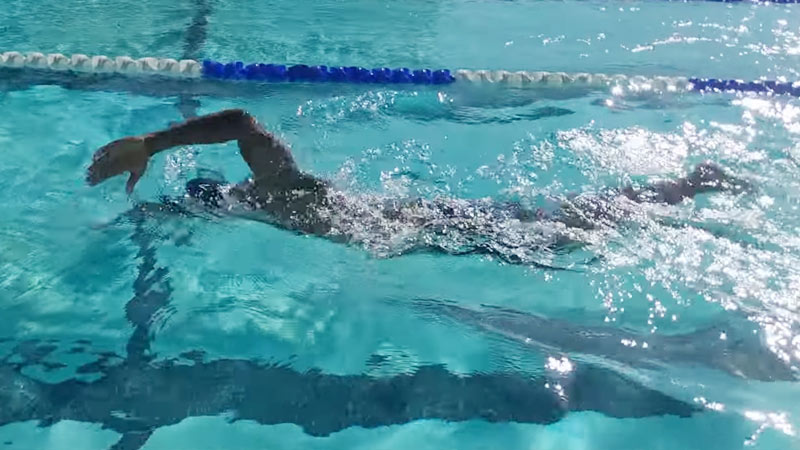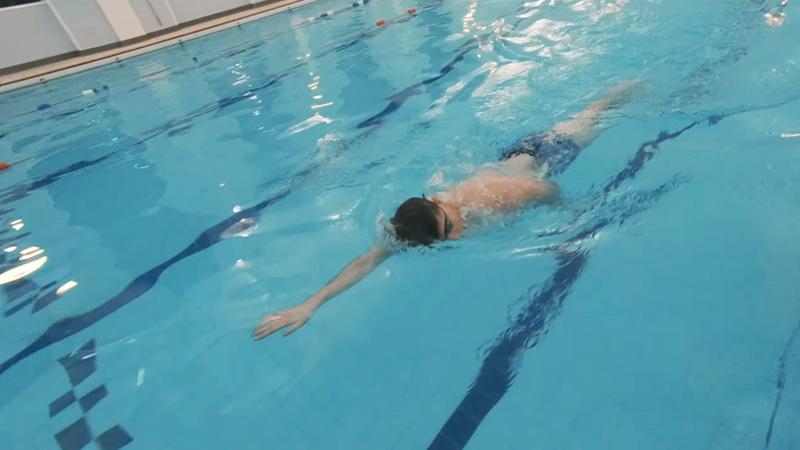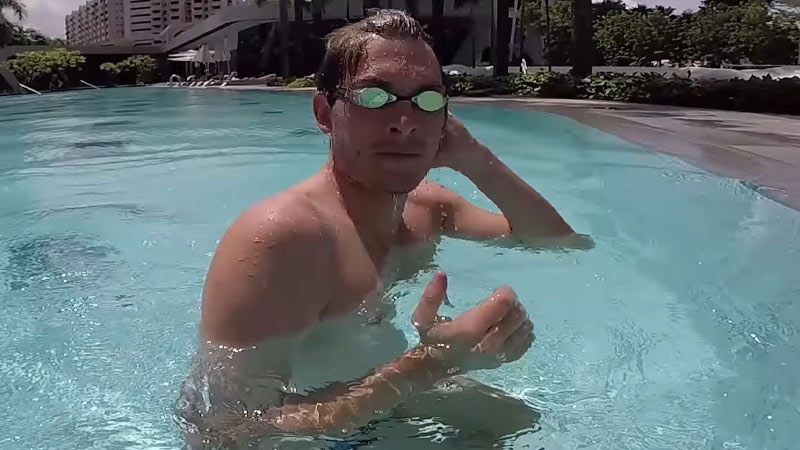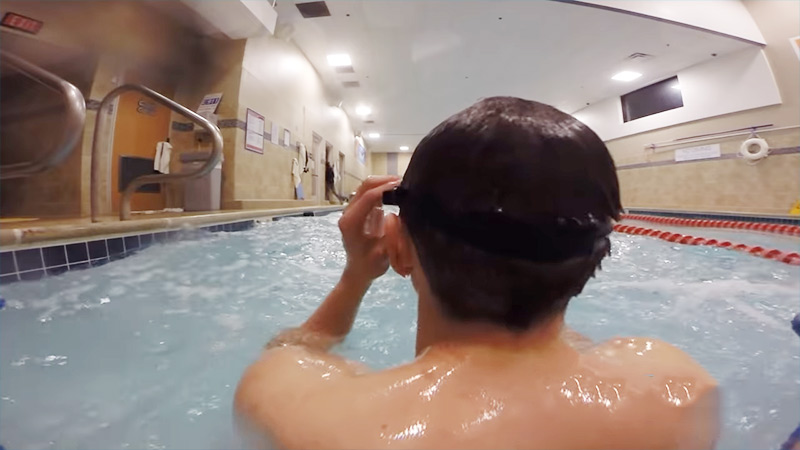The refreshing allure of a dip in the pool or a salty ocean wave is unbeatable, especially during the scorching summer months.
However, as enjoyable as these aquatic adventures are, they often leave us pondering a common dilemma: Do you have to wash your hair after swimming? The answer isn’t always a straightforward “yes” or “no.”
Your hair type, the type of water you’ve been swimming in, and personal preferences play crucial roles in determining the best course of action.
In this blog post, we’ll dive deep into the considerations that dictate post-swim hair care.
We’ll explore the impact of chlorine, saltwater, and other factors on your locks, and we’ll provide insights on when rinsing, shampooing, or employing alternative methods is most suitable.
By the end of this read, you’ll be equipped with the knowledge to keep your hair healthy and stunning, no matter your aquatic escapades. So, stay sharp.
Do You Have to Wash Your Hair After Swimming?
Many of you can’t decide whether you should or not wash chlorine out of your hair. Some are always so confused about whether is it bad to not wash the chlorine out of your hair.
Washing your hair after swimming is generally a good practice, but it may not always be necessary.
It depends on various factors. When you swim in a pool, chlorine and other chemicals can strip your hair of natural oils, potentially causing dryness and damage.
In such cases, it’s advisable to rinse and shampoo your hair to remove these chemicals. Saltwater from the ocean can also leave a residue that may be best washed away.
However, if you swim in freshwater, like a lake or river, and your hair doesn’t feel particularly dirty or affected, a simple rinse may suffice.
Always consider your hair type, water quality, and how your hair feels. Using a swim cap can help protect your hair from the harsh effects of chlorine or saltwater, reducing the need for immediate washing.
Benefits of Rinsing Your Hair After Swimming

Rinsing your hair after swimming, especially in pools or salt water, offers several benefits for maintaining healthy and vibrant hair:
Removal of Chlorine and Chemical Residues
Chlorine and other pool chemicals can strip your hair of its natural oils and leave behind residue. Rinsing immediately after swimming helps to remove these harsh chemicals, preventing potential damage and dryness.
Prevention of Hair Discoloration
Chlorine, in particular, can cause hair to turn green or become discolored, especially for those with lighter hair shades. A quick rinse can help minimize the risk of such discoloration.
Protection from Salt and Mineral Buildup
In the case of ocean or saltwater swimming, rinsing helps wash away salt and minerals, preventing the accumulation of these substances which can be damaging to hair over time.
Hydration and Rejuvenation
Freshwater rinsing can provide a quick refresh for your hair, removing sweat, sand, or dirt, and rehydrating your locks, leaving them feeling more manageable and healthier.
Reducing Tangles and Knots
Rinsing helps detangle hair and reduce the formation of knots, making post-swim hair care much easier. It also minimizes the risk of breakage when combing or brushing.
Do You Always Need to Shampoo?
Shampooing is a common practice for hair care, but it’s not always necessary and can vary depending on factors such as hair type, lifestyle, and personal preferences.
Here are some key points to consider:
Hair Type Matters
Different hair types have different needs. While some individuals with oily hair may need to shampoo frequently to remove excess oil and maintain a clean appearance, those with drier hair might not require frequent shampooing.
Over-shampooing can strip natural oils, causing dryness and damage in such cases.
Frequency of Activities
Your level of physical activity and exposure to environmental factors can influence how often you need to shampoo.
If you sweat heavily or are exposed to pollutants regularly, more frequent shampooing may be necessary to keep your scalp and hair clean.
Water Quality
The quality of the water you use for washing can also impact your hair.
Hard water can leave mineral deposits on your hair, making it necessary to shampoo more often to remove these buildups. Soft water may require less frequent shampooing.
Personal Preference
Some people prefer the feeling of freshly shampooed hair, while others may opt for less frequent shampooing to maintain natural oils and reduce potential damage.
Co-washing (using conditioner to cleanse the hair) is a popular alternative for those seeking a milder cleaning routine.
The “No-Poo” Method
Some individuals embrace the “no-poo” method, which involves washing hair with water only or using natural alternatives like apple cider vinegar and baking soda.
This approach is based on the belief that frequent shampooing with commercial products can be harsh on hair.
Whether you need to shampoo regularly depends on your unique hair type, lifestyle, and personal preferences.
Impact of Chlorine on Hair Overnight

Many of you often ask whether can you sleep with chlorine in your hair. The impact of chlorine on hair overnight can have several negative effects, especially if not properly addressed:
Dryness and Damage
Chlorine is a strong chemical used to sanitize swimming pools, and it can strip your hair of its natural oils, leaving it dry and damaged.
When chlorine remains in your hair overnight, it has more time to penetrate the hair shaft, potentially causing increased dryness and weakening the hair’s structure.
Discoloration
If your hair is exposed to chlorine for an extended period, it can lead to discoloration.
Blonde or light-colored hair is particularly susceptible to turning green due to prolonged exposure to chlorine. This discoloration can be challenging to reverse.
Weakened Cuticles
Chlorine can disrupt the protective cuticle layer of your hair, making it more vulnerable to damage from other environmental factors, heat, and styling.
Leaving chlorine in your hair overnight can exacerbate this problem and weaken the overall health of your hair.
Increased Breakage and Split Ends
Dry, brittle hair resulting from chlorine exposure is more prone to breakage and split ends.
When chlorine is not washed out before bedtime, it can contribute to these issues, making your hair look and feel unhealthy.
Itchy Scalp and Irritation
Chlorine can also lead to scalp irritation and itching, which can become more pronounced if you sleep with chlorine-laden hair.
This discomfort can disrupt your sleep and lead to more significant scalp issues if not addressed promptly.
To mitigate the impact of chlorine on your hair when swimming, it’s advisable to rinse your hair thoroughly after swimming and use a specialized chlorine-removing shampoo.
What Happens If You Don’t Wash Your Hair After Swimming

If you don’t wash your hair after swimming, especially in pools or saltwater, it can lead to several undesirable consequences for your hair and scalp:
Chemical Buildup
Chlorine and other pool chemicals, as well as salt and minerals from saltwater, can accumulate in your hair.
Over time, this buildup can cause your hair to become dry, brittle, and discolored. Chlorine, in particular, can strip away your hair’s natural oils, leaving it more vulnerable to damage.
Weakened Hair Structure
Extended exposure to chlorine and other chemicals can weaken the structural integrity of your hair.
It can lead to damage to the hair shaft, making it more susceptible to breakage and split ends. Weakened hair is also more prone to tangles and knots.
Skin and Scalp Issues
Pool chemicals and salt water can irritate your scalp and cause itching or flaking.
Prolonged contact with these substances can exacerbate these issues, potentially leading to more significant scalp discomfort and even skin problems if left unaddressed.
Discoloration
Chlorine can cause hair, especially lighter-colored hair, to turn green or develop an undesirable tint.
Failing to wash your hair after swimming can allow the chlorine to continue affecting your hair’s color, making it more challenging to reverse the discoloration.
Unpleasant Odor
Chlorine and salt water can leave an unpleasant odor in your hair if not properly rinsed out. This can be especially noticeable when your hair dries, and the smell may linger if not addressed.
To prevent these issues, it’s essential to rinse your hair thoroughly after swimming and use a shampoo specifically designed to remove chlorine or salt buildup.
Tips for Post-Pool Hair Care
Maintaining healthy and vibrant hair after swimming in a pool requires proper post-pool hair care.
Here are some less common but effective tips for post-pool hair care:
Pre-Pool Hair Treatment
Apply a hair mask or leave-in conditioner to your hair before swimming. This can act as a barrier, reducing the absorption of pool chemicals and saltwater.
Choose products with SPF protection to shield your hair from UV damage while swimming outdoors.
Vinegar Rinse
After swimming, consider rinsing your hair with a mixture of water and apple cider vinegar.
This can help neutralize the effects of chlorine and saltwater and restore your hair’s pH balance. The acidity of vinegar can also help remove any mineral deposits from hard water.
Clarifying Shampoo
Use a clarifying shampoo once a week to remove any lingering pool chemicals or salt buildup.
These shampoos are designed to deep-clean your hair and remove impurities, leaving it fresh and free from residue.
Cold Rinse
After shampooing and conditioning, finish your post-pool hair care routine with a cold water rinse. Cold water helps to seal the hair’s cuticle and lock in moisture, making your hair smoother and shinier.
It also helps with blood circulation in the scalp, promoting hair health.
Protective Hairstyles
Opt for protective hairstyles like braids, buns, or twists after swimming. These styles can help prevent tangling and breakage caused by chlorine or saltwater.
You can also use hair-friendly accessories like silk scarves or headwraps to protect your hair from sun and wind exposure.
FAQs
Is it bad to sleep with chlorine in your hair?
Sleeping with chlorine in your hair is not recommended. Chlorine can damage your hair over time, making it dry, brittle, and prone to breakage. It can also cause scalp irritation.
To maintain healthy hair, it’s best to rinse or wash it after swimming in chlorinated water.
Do you have to wash your hair after swimming?
You don’t necessarily have to wash your hair immediately after swimming, but it’s advisable to rinse it thoroughly. Chlorine and other pool chemicals can be harsh on your hair, so rinsing can help remove most of these substances.
Using a gentle shampoo and conditioner later can provide better protection and keep your hair healthy.
What happens if you don’t wash your hair after swimming in chlorine?
If you don’t wash your hair after swimming in chlorine, it can lead to various issues over time.
Chlorine can cause your hair to become dry, brittle, and discolored. It may also lead to scalp irritation and dandruff. Regular exposure without proper care can weaken and damage your hair.
Can I sleep with chlorine in my hair?
Sleeping with chlorine in your hair is not recommended. Chlorine can linger in your hair, causing damage and dryness.
It’s better to rinse or wash your hair to remove chlorine after swimming to maintain its health and appearance.
Should I wash my hair after swimming?
While it’s not an absolute requirement, it’s a good idea to wash your hair after swimming, especially in chlorinated water.
Rinsing and using a gentle shampoo and conditioner can help prevent chlorine damage, maintain hair health, and keep it looking its best.
Wrapping Up
In the world of hair care, there’s no one-size-fits-all solution, and this certainly holds true for the question of whether or not to wash your hair after swimming.
Your hair’s unique characteristics, the water’s quality, and your personal preferences all come into play.
While some may find that a simple rinse suffices, others may benefit from a thorough shampooing.
Understanding the nuances of post-swim hair care is key to maintaining healthy, beautiful locks. So, whether you’re a frequent pool-goer or an occasional beachcomber, tailor your hair care routine to suit your needs.
Embrace the knowledge of when to wash, when to rinse, and when to consider alternatives, such as swim caps or specialty products.
With this information in hand, you can confidently enjoy your aquatic adventures while keeping your hair in top condition. Thank you so much.







